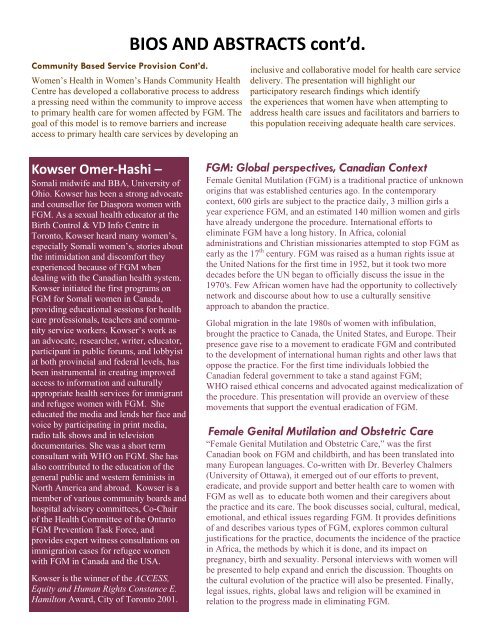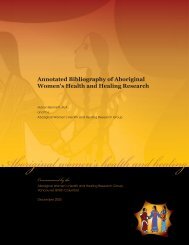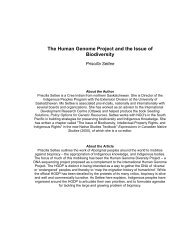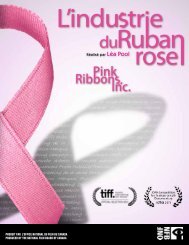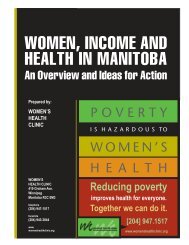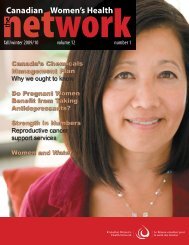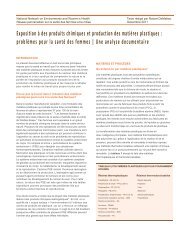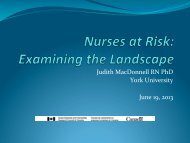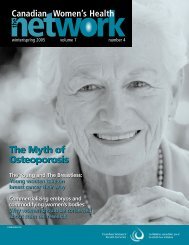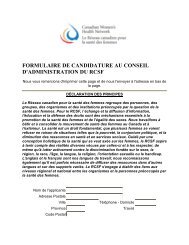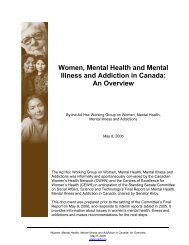FGC Symposium Program.pdf - Canadian Women's Health Network
FGC Symposium Program.pdf - Canadian Women's Health Network
FGC Symposium Program.pdf - Canadian Women's Health Network
You also want an ePaper? Increase the reach of your titles
YUMPU automatically turns print PDFs into web optimized ePapers that Google loves.
Community Based Service Provision Cont’d.BIOS AND ABSTRACTS cont’d.Women’s <strong>Health</strong> in Women’s Hands Community <strong>Health</strong>Centre has developed a collaborative process to addressa pressing need within the community to improve accessto primary health care for women affected by FGM. Thegoal of this model is to remove barriers and increaseaccess to primary health care services by developing aninclusive and collaborative model for health care servicedelivery. The presentation will highlight ourparticipatory research findings which identifythe experiences that women have when attempting toaddress health care issues and facilitators and barriers tothis population receiving adequate health care services.Kowser Omer‐Hashi –Somali midwife and BBA, University ofOhio. Kowser has been a strong advocateand counsellor for Diaspora women withFGM. As a sexual health educator at theBirth Control & VD Info Centre inToronto, Kowser heard many women’s,especially Somali women’s, stories aboutthe intimidation and discomfort theyexperienced because of FGM whendealing with the <strong>Canadian</strong> health system.Kowser initiated the first programs onFGM for Somali women in Canada,providing educational sessions for healthcare professionals, teachers and communityservice workers. Kowser’s work asan advocate, researcher, writer, educator,participant in public forums, and lobbyistat both provincial and federal levels, hasbeen instrumental in creating improvedaccess to information and culturallyappropriate health services for immigrantand refugee women with FGM. Sheeducated the media and lends her face andvoice by participating in print media,radio talk shows and in televisiondocumentaries. She was a short termconsultant with WHO on FGM. She hasalso contributed to the education of thegeneral public and western feminists inNorth America and abroad. Kowser is amember of various community boards andhospital advisory committees, Co-Chairof the <strong>Health</strong> Committee of the OntarioFGM Prevention Task Force, andprovides expert witness consultations onimmigration cases for refugee womenwith FGM in Canada and the USA.Kowser is the winner of the ACCESS,Equity and Human Rights Constance E.Hamilton Award, City of Toronto 2001.FGM: Global perspectives, <strong>Canadian</strong> ContextFemale Genital Mutilation (FGM) is a traditional practice of unknownorigins that was established centuries ago. In the contemporarycontext, 600 girls are subject to the practice daily, 3 million girls ayear experience FGM, and an estimated 140 million women and girlshave already undergone the procedure. International efforts toeliminate FGM have a long history. In Africa, colonialadministrations and Christian missionaries attempted to stop FGM asearly as the 17 th century. FGM was raised as a human rights issue atthe United Nations for the first time in 1952, but it took two moredecades before the UN began to officially discuss the issue in the1970's. Few African women have had the opportunity to collectivelynetwork and discourse about how to use a culturally sensitiveapproach to abandon the practice.Global migration in the late 1980s of women with infibulation,brought the practice to Canada, the United States, and Europe. Theirpresence gave rise to a movement to eradicate FGM and contributedto the development of international human rights and other laws thatoppose the practice. For the first time individuals lobbied the<strong>Canadian</strong> federal government to take a stand against FGM;WHO raised ethical concerns and advocated against medicalization ofthe procedure. This presentation will provide an overview of thesemovements that support the eventual eradication of FGM.Female Genital Mutilation and Obstetric Care“Female Genital Mutilation and Obstetric Care,” was the first<strong>Canadian</strong> book on FGM and childbirth, and has been translated intomany European languages. Co-written with Dr. Beverley Chalmers(University of Ottawa), it emerged out of our efforts to prevent,eradicate, and provide support and better health care to women withFGM as well as to educate both women and their caregivers aboutthe practice and its care. The book discusses social, cultural, medical,emotional, and ethical issues regarding FGM. It provides definitionsof and describes various types of FGM, explores common culturaljustifications for the practice, documents the incidence of the practicein Africa, the methods by which it is done, and its impact onpregnancy, birth and sexuality. Personal interviews with women willbe presented to help expand and enrich the discussion. Thoughts onthe cultural evolution of the practice will also be presented. Finally,legal issues, rights, global laws and religion will be examined inrelation to the progress made in eliminating FGM.


